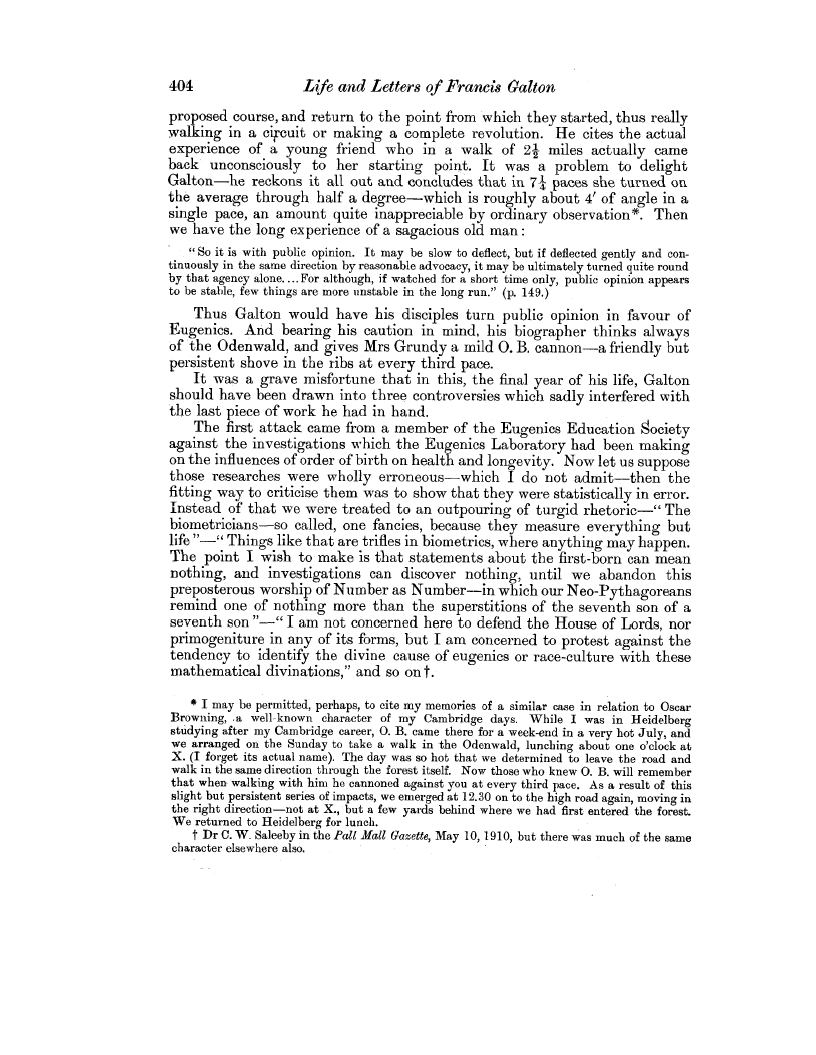| ||||||

OCR Rendition - approximate
404 Life and Letters of Francis Galton proposed course, and return to the point from which they started, thus really walking in a circuit or making a complete revolution. He cites the actual experience of a young friend who in a walk of 2-1 miles actually came back unconsciously to her starting point. It was a problem to delight Galton-he reckons it all out and concludes that in 7-.1 paces she turned on the average through half a degree-which is roughly about 4' of angle in a single pace, an amount quite inappreciable by ordinary observation*. Then we have the long experience of a sagacious old man "So it is with public opinion. It may be slow to deflect, but if deflected gently and continuously in the same direction by reasonable advocacy, it may be ultimately turned quite round by that agency alone.... For although, if watched for a short time only, public opinion appears to be stable, few things are more unstable in the long run." (p. 149.) Thus Galton would have his disciples turn public opinion in favour of Eugenics. And bearing his caution in mind, his biographer thinks always of the Odenwald, and gives Mrs Grundy a mild O. B. cannon-a friendly but persistent shove in the ribs at every third pace. It was a grave misfortune that in this, the final year of his life, Galton should have been drawn into three controversies which sadly interfered with the last piece of work he had in hand. The first attack came from a member of the Eugenics Education society against the investigations which the Eugenics Laboratory had been making on the influences of order of birth on health and longevity. Now let us suppose those researches were wholly erroneous-which I do not admit-then the fitting way to criticise them was to show that they were statistically in error. Instead of that we were treated to an outpouring of turgid rhetoric-" The biometricians-so called, one fancies, because they measure everything but life "-" Things like that are trifles in biometrics, where anything may happen. The point I wish to make is that statements about the first-born can mean nothing, and investigations can discover nothing, until we abandon this preposterous worship of Number as Number-in which our Neo-Pythagoreans remind one of nothing more than the superstitions of the seventh son of a seventh son "-" I am not concerned here to defend the House of Lords, nor primogeniture in any of its forms, but I am concerned to protest against the tendency to identify the divine cause of eugenics or race-culture with these mathematical divinations," and so on t. * I may be permitted, perhaps, to cite my memories of a similar case in relation to Oscar Browning, a well-known character of my Cambridge days. While I was in Heidelberg studying after my Cambridge career, O. B. came there for a week-end in a very hot July, and we arranged on the Sunday to take a walk in the Odenwald, lunching about one o'clock at X. (I forget its actual name). The day was so hot that we determined to leave the road and walk in the same direction through the forest itself. Now those who knew O. B. will remember that when walking with him he cannoned against you at every third pace. As a result of this slight but persistent series of impacts, we emerged at 12.30 on to the high road again, moving in the right direction-not at X., but a few yards behind where we had first entered the forest. We returned to Heidelberg for lunch. t Dr C. W. Saleeby in the Pall Mall Gazette, May 10, 1910, but there was much of the same character elsewhere also.
|